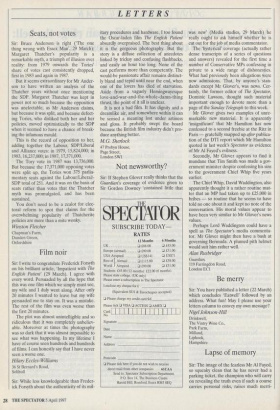LETTERS Seats, not votes
Sir: Bruce Anderson is right (`The one thing wrong with Essex Man', 29 March): Margaret Thatcher's popularity is a remarkable myth, a triumph of illusion over reality: from 1979 onwards the Tories' share of votes cast consistently dropped, first in 1983 and again in 1987.
But it seems extraordinary for Mr Ander- son to have written an analysis of the Thatcher years without once mentioning the SDP. Margaret Thatcher was kept in power not so much because the opposition was unelectable, as Mr Anderson claims, but because it was split, and because defect- ing Tories, who disliked both her and her policies, moved optimistically to the SDP when it seemed to have a chance of break- ing the infamous mould.
This is the record of opposition to her, adding together the Labour, SDP/Liberal and Alliance votes: in 1979, 15,824,000; in 1983, 16,237,000; in 1987, 17,371,000.
The Tory vote in 1987 was 13,736,000. But because the 17,371,000 opposing votes were split up, the Tories won 375 parlia- mentary seats against the Labour/Liberal/- SDP total of 251. And it was on the basis of seats rather than votes that the Thatcher myth was promulgated, and has been sustained.
You don't need to be a zealot for elec- toral reform to spot that claims for the overwhelming popularity of Thatcherite policies are more than a mite wonky.
Winston Fletcher
Chapman's Farm, Dunden Green, Oxfordshire


























































 Previous page
Previous page